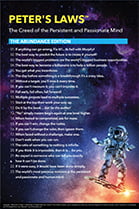
Last week, I talked about the exponential change that’s occurred over the last 10 years.
This week, I want to explore what the world will look like in the next 10 years.
P.S. Send any tips to our team by clicking here, and send your friends and family to this link to subscribe to Abundance Insider.
The World in 2025
In 2025, in accordance with Moore’s Law, we will see an acceleration in the rate of change as we move closer to a world of true abundance.
Here are eight areas where we’ll see extraordinary transformation in the next decade:
- A $1,000 Human Brain: In 2025, $1000 should buy you a computer able to calculate at 10^16 cycles per second (10,000 trillion cycles per second), the equivalent processing speed of the human brain.
- A Trillion-Sensor Economy: The Internet of Everything describes the networked connections between devices, people, processes and data. By 2025, the IoE will exceed 100 billion connected devices, each with a dozen or more sensors collecting data. This will lead to a trillion-sensor economy driving a data revolution beyond our imagination. Cisco’s recent report estimates the IoE will generate $19 trillion of newly created value.
- Perfect Knowledge: We’re heading towards a world of perfect knowledge. With a trillion sensors gathering data everywhere (autonomous vehicles, satellite systems, drones, wearables, cameras), you’ll be able to know anything you want, anytime, anywhere, and query that data for answers and insights.
- 8 Billion Hyper-Connected People: Facebook (Internet.org), SpaceX, Google (Project Loon), Qualcomm & Virgin (OneWeb) are planning to provide global connectivity to every human on Earth at speeds exceeding 1 Megabit per second. We will grow from three to eight billion connected humans, adding five billion new consumers into the global economy. They represent tens of trillions of new dollars flowing into the global economy. And they are not coming online like we did 20 years ago with a 9600 modem on AOL. They’re coming online with a 1 Mbps connection and access to the world’s information on Google, cloud 3D printing, Amazon Web Services, artificial intelligence with Watson, crowdfunding, crowdsourcing, and more.
- Disruption of Healthcare: Existing healthcare institutions will be crushed as new business models with better and more efficient care emerge. Thousands of startups, as well as today’s data giants (Google, Apple, Microsoft, SAP, IBM, etc.) will all enter this lucrative $3.8 trillion healthcare industry with new business models that dematerialize, demonetize and democratize today’s bureaucratic and inefficient system. Biometric sensing (wearables) and Artificial Intelligence will make each of us the CEOs of our own health. Large-scale genomic sequencing and machine learning will allow us to understand the root cause of cancer, heart disease and neurodegenerative disease and what to do about it. Robotic surgeons can carry out an autonomous surgical procedure perfectly (every time) for pennies on the dollar. Each of us will be able to regrow a heart, liver, lung or kidney when we need it, instead of waiting for the donor to die.
- Augmented Reality and Virtual Reality: Billions of dollars invested by Facebook (Oculus), Google (Magic Leap), Microsoft (Hololens), Sony, Qualcomm, HTC and others will lead to a new generation of displays and user interfaces. The screen as we know it – on your phone, your computer and your TV – will disappear and be replaced by eyewear. Not the geeky Google Glass, but stylish equivalents to what the well-dressed fashionistas are wearing today. The result will be a massive disruption in a number of industries ranging from consumer retail, to real estate, education, travel, entertainment, and the fundamental ways we operate as humans.
- Early Days of JARVIS: Artificial intelligence research will make strides in the next decade. If you think Siri is useful now, the next decade’s generation of Siri will be much more like JARVIS from Iron Man, with expanded capabilities to understand and answer. Companies like IBM Watson, DeepMind and Vicarious continue to hunker down and develop next-generation AI systems. In a decade, it will be normal for you to give your AI assistant access to listen to all of your conversations, read your emails and scan your biometric data because the upside and convenience will be so immense.
- Blockchain technology: If you haven’t heard of the blockchain technology, I highly recommend you read up on it. You might have heard of bitcoin, which is the decentralized (global), democratized, highly secure cryptocurrency based on the blockchain. But the real innovation is the blockchain itself, a protocol that allows for secure, direct (without a middleman), digital transfers of value and assets (think money, contracts, stocks, IP). Investors like Marc Andreesen have poured tens of millions into the development and believe this is as important of an opportunity as the creation of the Internet itself.
Bottom Line: We Live in the Most Exciting Time Ever
This is the sort of content and conversations we discuss at my 250-person executive mastermind group called Abundance 360. The program is highly selective and has ~90% of the spots filled. You can apply here.
Share this email with your friends, especially if they are interested in any of the areas outlined above.
We are living toward incredible times where the only constant is change, and the rate of change is increasing.
P.S. Know someone who would benefit from getting Abundance Insider? Send them to this link to sign up.
P.P.S. Please forward this to your best clients, colleagues and friends — especially those who could use some encouragement as they pursue big, bold dreams.







